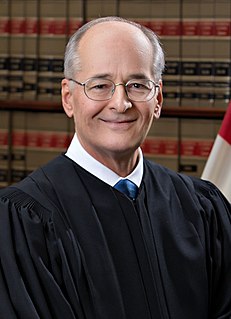A Quote by Socrates
It is not the purpose of a juryman's office to give justice as a favor to whoever seems good to him, but to judge according to law, and this he has sworn to do.
Related Quotes
...the statement, "The purpose of the law is to cause justice to reign," is not a rigorously accurate statement. It ought to be stated that the purpose of the law is to prevent injustice from reigning. In fact, it is injustice, instead of justice, that has an existence of its own. Justice is achieved only when injustice is absent.
Jurors have found, again and again, and at critical moments, according to what is their sense of the rational and just. If their sense of justice has gone one way, and the case another, they have found "against the evidence," ... the English common law rests upon a bargain between the Law and the people: The jury box is where the people come into the court: The judge watches them and the people watch back. A jury is the place where the bargain is struck. The jury attends in judgment, not only upon the accused, but also upon the justice and the humanity of the Law.
The Gospel is temporary, but the law is eternal and is restored precisely through the Gospel. Freedom from the law consists, then, not in the fact that the Christian has nothing more to do with the law, but lies in the fact that the law demands nothing more from the Christian as a condition of salvation. The law can no longer judge and condemn him. Instead he delights in the law of God according to the inner man and yearns for it day and night.
I don't believe we need a good conservative judge, and I don't believe we need a good liberal judge. I subscribe to the Justice Potter Stewart standard. He was a justice on the Supreme Court of the United States. And he said the mark of a good judge, good justice, is that when you're reading their decision, their opinion, you can't tell if it's written by a man or woman, a liberal or a conservative, a Muslim, a Jew or a Christian. You just know you're reading a good judicial decision.
I have no doubt that if confirmed, Judge Gorsuch would help to restore confidence in the rule of law. His years on the bench reveal a commitment to judicial independence - a record that should give the American people confidence that he will not compromise principle to favor the president who appointed him.
No person shall be restrained of his liberty but by regular process from a court of justice, authorized by a general law. . . . On complaint of an unlawful imprisonment to any judge whatsoever, he shall have the prisoner immediately brought before him and shall discharge him if his imprisonment be unlawful. The officer in whose custody the prisoner is shall obey the order of the judge, and both judge and officer shall be responsible civilly and criminally for a failure of duty herein.
There has been no clearer principle of English or American constitutional law than that, in criminal cases, it is not only the power and duty of juries to judge what are the facts, what is the law, and what is the moral intent of the accused; but that it is also their power, and their primary and paramount duty, to judge the justice of the law, and to hold all laws invalid, that are, in their opinion, unjust or oppressive, and find all persons guiltless in violating, or resisting the execution of, such laws.









































